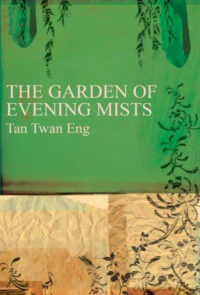Analysing the returning echoes of our memory
 The Garden of Evening Mists
The Garden of Evening Mists
by Tan Twan Eng
This is an extraordinary book. It touches on some of the most horrific human actions of the early 20th century. And yet it manages to be a gentle, hopeful story.
It centres around Teoh Yun Ling, a Malay-Chinese woman who during her life has been a judge, prosecutor, landscape gardener and a prisoner of the Japanese during the Second World War. The book opens with her retirement, following which she travels from Kuala Lumpur to the Cameron Highlands, a tea-growing region of Malaysia where she has friends and property. Here, Yun Ling starts to write her memoirs.
The narrative switches to her first arrival in the Cameron Highlands, when she is a young prosecutor who has quit her job on the War Crimes Commission and needs respite at the home of a family friend, Magnus. She is still angry about the war and in particular the Japanese war crimes committed. She bears physical scars as well as psychological ones. She suffers in particular because her sister did not survive the camp where they were both held.
“In the low mists over the hills, an orange glow broods, as if the trees are on the fire. Bats are flooding out from the hundreds of caves that perforate these mountainsides. I watch them plunge into the mists without any hesitation, trusting in the echoes and silences in which they fly. Are all of us the same, I wonder, navigating our lives by interpreting the silences between words spoken, analysing the returning echoes of our memory in order to chart the terrain, in order to make sense of the world around us?”
Yun Ling has a plan – to create a Japanese garden as a memorial to her sister – and Magnus suggests that his neighbour could help. Arimoto was previously the head gardener of Emperor Hirohito, but on losing that position moved to the Malay peninsula. He is creating his own garden – Yugiri, or the Garden of Evening Mists. Yun Ling doesn’t know if she can work closely with a Japanese man, but is surprised by how disappointed she is when he calmly says no. Yun Ling and Arimoto come to a compromise that allows them to help each other, and get to know each other – no small accomplishment for two very private people.
In the present day, Yun Ling is concerned with memory and legacy – her own and those of her friends. She has to confront facts about her past that she has kept hidden from everyone. And she has to fight to restore Yugiri to what it was, rather than join the growing movement for gardens that include only native plants and styles.
“Beneath my eyelids the captured light throbbed and gradually faded away…I listened to the wind and imagined it passing from tree to tree, from leaf to leaf. In my mind I saw the wings of a bird stirring the air. I watched leaves spiralling from the highest branches to the mossy ground. I smelled the scents of the garden: a lily, newly opened; ferns heavy with dew; the bark of a tree crumbling beneath the voracious assault of termites, the smell powdery with an undertone of dampness and rot. Time did not exist; I had no idea of how many minutes had passed. And what was time but merely a wind that never stopped?”
Through these two timelines Eng tracks the Malay region through most of the 20th century, from British rule to Japanese occupation to the Malayan Emergency and finally Malaysia. There’s a lot of horror and brutality, and there were certainly moments that were shocking and upsetting, but for the most part this is a calm, peaceful book, thanks to its concentration on the art of landscape gardening.
That may sound dull, and I certainly didn’t go into this book with a passionate interest in gardening (despite my surname). But Eng finds just the right way of describing nature, and Arimoto’s passion for working with it. It’s a story about people with complicated pasts, complicated pains, finding themselves and healing. It makes complete sense to me that they would not only turn to nature, but that they would prefer a controlled, tamed version of nature after what they have lived through.
This book also includes some fascinating (to me, at least) discussion of the links between landscape gardening, ukiyo-e (Japanese woodblock prints) and horimono (full-torso or even full-body tattoos). I had read about the concept of the floating world before (notably in Kazuo Ishiguro’s novel An Artist of the Floating World, which I think I need to read again) but Eng beautifully explains what it all stands for and how it relates to real life.
Happily, the Bristol City Museum and Art Gallery is currently running a series of shows of ukiyo-e that they have dug out of their archives, and it added extra meaning to both the prints and this novel to see the first show of ukiyo-e just a few days after finishing the book. I highly recommend both.
Published 2012 by Myrmidon.
Source: present from my Dad.